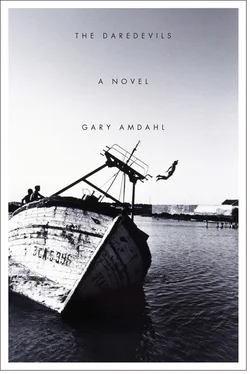I have neither a cool head nor clean hands, Father. I wish you could forgive me. I never saw the need.
“I sometimes find myself thinking he had to have been murdered,” Alexander continued. “But the terrible truth is that an old Stoic would certainly think twice but not shy away from taking the matter in his own hands. Clean hands. Cool head. The end.”
Charles secured a bottle of morphine pills without much trouble, and when he and Vera had taken a dose, he told her about his father’s suicide. She said nothing, and they remained silent for several hours, thinking, in a deep, ceaselessly absorbing twilight that never changed, of the peace that passed all understanding: death.
Mastering an urge toward immediate and pointless violence, or not so much mastering it as feeling it ebb back whence it had flowed, Charles watched an old couple approach Vera and Daisy.
“Daisy!” the man shouted. “Daisy! Over here!” the woman shouted.
Charles watched the three embrace, three small plain people holding each other by the shoulders, patting each other’s backs, and thought he saw in it a dignity of purpose he wanted for himself. Daisy seemed to know where she was going and what she was doing and why she was doing it, and it was fascinating to watch. It was the simplest or rather most ordinary of acts, but she was committed and persuasive and pulling it off so well he was sure she must have some sense of how porous her molecular structure was with all the other structures around her. Her act would seem to be false or superficial otherwise — accepted of course, as all such acts were, but accepted with that yawning indifference that marked all mediocre acting. He was quite sure he lacked — now that the change had come — this dignity — despite a hope, a wish to believe, to tell, and to act the story that he was becoming a good man — that everything beguiling and forceful in his character was there now only to hide that lack, and he found his face hot with embarrassment.
There was something in her gaze; in his own — admitting that he perceived it from the other side of consciousness — nothing, just a lot of darting back and forth, reconnaissance of the audience and deep studies of the sky. And with that thought he looked up, saw that Daisy and her friends had gone, that the background of the picture had darkened perceptibly, as if it were a very old oil painting, but that the colors had become somehow richer for it. He wondered how much longer he would be able, be allowed, to play the fool — and recognized instantly what most identified him as a fool: this belief that he could choose a role, that he could pick and choose as it were amongst the great parts of history. Almost a year now had gone by and yet it seemed that a fraction of a second, the flash of a thought, could undo it all, could unwind the clock, could make these people milling about this train station in the middle of nowhere disappear in a cloud of smoke. He had been pretending to be someone else, but he didn’t know whom. I have not been convincing. I have been an object of derision. My duplicity has been effortless and yet I am very tired. I am too tired to sleep. Every room I enter becomes not merely a stage — that would be unremarkable — but the same stage I just tried to exit, which is impossible.
Hillsboro was a town of a thousand people on the Goose River in North Dakota, ten miles from the Red River of the North and the Minnesota border. Its town hall was a brilliant, almost translucent white, with startling black doors, upon one of which was tacked a large white poster with large black lettering announcing an informative speech by a representative of the Nonpartisan League. Next to the hall was a three-story red-brick hotel, called the Wheat Growers. Vera too had watched Daisy as she was met by an old farmer and his wife, gaunt, dark-eyed, windburned people whose hands looked fantastically, almost grotesquely powerful. The man’s legs seemed like tree trunks and the woman’s dress seemed as if draped over iron. Signaling their recognition with sudden white grins that made their dark eyes flash blue, they greeted Daisy. The man shook her hand and the woman embraced her. They moved slowly but surely, their gestures strong and fluid, as if of a heavy viscosity.
Vera looked away and the white hall was now pale red, the hotel orange. Between the setting sun and these few buildings stood nothing. Charles touched the small of her back. A man who had been lounging on the steps of the hall took a step toward them, getting their attention, staring openly at them. Then he furrowed his brow and lit a cigarette. Puffing, he nodded at them and moved off.
“Another secret agent,” Charles said in a stage whisper. “Let him make the first move. Remember who you are?”
“No, who am I?”
“My wife. And you don’t believe in free love.”
“Oh yes,” said Vera. “I am pretending to be delighted, but thinking, no, no, I can’t be two people at once. I get too confused. Something bad will happen.”
“No: you do not have to be two people.”
“Something bad will happen anyway.”
“It’s impossible to be more than one person.”
“Something bad will happen anyway.”
“I fear that is merely your growing dependency on narcotics talking.”
“Something bad will happen and the cause is irrelevant.”
“When you’re high, the assumption that something bad will happen is intact and clear but you don’t care.”
“That is a terribly dispiriting and counterproductive thing to say.”
“When I first met you, you had a very different view of things that happened and why.”
“Yes! It’s remarkable, isn’t it? I was very much in line with the aphorisms of your old buddy the Colonel!”
“Roosevelt? How so.”
“‘Get action. Do something. Be sane. Be somebody. Get action.’”
“The action gets you. Something does you. It’s impossible not to be somebody. It’s insane to think otherwise.”
Vera said nothing. Charles snorted.
“‘Be sane.’ Jesus fucking Christ on a flatcar. The assassin Schrank was only doing what Teddy advised.”
“Teddy’s voice was at least one of the voices he heard.”
“Schrank was getting action and being somebody in the only way he could.”
“I sometimes think that was why, at least part of why, the former president was apparently so unmoved by the bullet in his bone and the blood all over the place.”
“I think you’re right. I don’t think he held grudges. He was moving too fast. I will give him that. I will give him more than that. But I won’t say he hasn’t got it bass-ackward where the self and the act are concerned.”
“He’s not the thinker you are, Chick.”
“I don’t know if you’re being sarcastic or not.”
“I don’t know, either.”
“My father too,” said Charles, “was a very forgiving man.”
“Not at the end, he wasn’t.”
Vera spoke so softly Charles wasn’t sure what she’d said, or even if she’d said anything. Maybe it had just been a sigh that wanted to be words.
“I can’t forgive the bombers,” he said.
“No,” said Vera.
The sun shone across the flat wind-surging windless-falling land as if it were a simple world of clear light, black dirt, and green plants, of wheat growers and wheat and a little hotel where they could rest when they could not get home.
“I have been— I am —scared to death,” Vera said, completing her thought.
Charles began to suspect the presence of a force, a new kind of gravity, that had begun to draw things unto itself.
Daisy spoke and Vera studied her critically, thinking her altogether wrong for the part. She was too funny for this dry routine. The subject was the “double profits” the millers were enjoying as they shipped grain to Liverpool and war-hungry England. She had a chart that showed the price spread between Duluth and Liverpool, the handling, insurance, ocean freight, and elevator costs, and the amount of the second cut of profit — and Vera, the true performer, thought she was reading her text. It was possible she was simply trying to appear calm and rational, but it was flat, nobody was being moved. Carefully Daisy began to suggest that the war was not a good war, that it was not the war that was being advertised at all. She made reference to a newspaper report that had German women being required by their government to bear children. And then she said that she believed American women would never let themselves be used as “brood sows for future wars.”
Читать дальше












